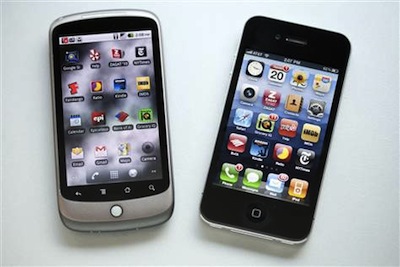An article published by Seth Weintraub over at Fortune last week made the rounds of the Internet detailing how the Android platform will “explode” next year thanks to relatively low-cost components. Broadcom has announced a new 3G HSDPA chipset called BCM2157 that allows for popular specs like Bluetooth, GPS, dual core ARM processors, 5MP cameras and capacitive displays. Broadcom is marketing this new chipset to Android OEMs. And the best part, according to Handset Line of Business for Broadcom Jim Tran? Phones built on the new chipset will retail under $100, possibly even touching the $75 price point. And we’re talking about retail prices of unsubsidized phones. That would allow “average users” who don’t normally spend hundreds of dollars on smartphone to buy a high-end Android phone and runs apps on it.
Weintraub followed up to his Fortune story on 9to5mac today:
I think if we are just talking about numbers, Android phones will outnumber iPhone. In fact, it is pretty apparent they already do. There might one day even be more apps available for Android than iOS. But the iPhone is still the better experience and has a big, passionate following. Apple is also evolving the iOS to new forms including the AppleTV and iPad.
MG Siegler at TechCrunch posted his thoughts about Apple’s strategy in regards to these new cheap Android handsets as well:
And so the only way for the iPhone to “beat” Android would be for Apple to either open iOS up in the same way that Android is, or to create a huge variety of iPhones spread across the spectrum in terms of features and price. Neither of those things is going to happen. Nor should they happen. The first simply isn’t in Apple’s DNA. It would create an ecosystem of crappy iPhones that Apple had no control over.
I think we all agree that, in the end, it’s possible that Android’s raw numbers will be bigger than Apple’s. After all, Android ships on hundreds of different devices which are generally cheaper than the iPhone and are going to get even cheaper next year anyway. Price-wise, Android devices will go down. So down that the average user who’s never bought a smartphone before will consider getting a new Android device because it’s sold at $99 at Best Buy. With such a device, he will be able to subscribe to month-by-month plans offered by carriers or skip the carrier data plans altogether and just rely on cheap voice and messaging plans and connect to the internet using free WiFi hotspots. That seems unlikely to me (mostly because we don’t have so many hotspots here in Italy) but I’m sure cheaper devices will change the approach of OEMs to carriers. The question is, though: what’s Apple going to do about it?
The way I see it, nothing. Not because Steve Jobs doesn’t want people to be able to buy an iPhone for a lower price (in fact, previous generation iPhones are always sold at $99 with a two year AT&T contract) or is firmly convinced Apple devices “must cost money”. The simple answer is that Steve Jobs’ Apple doesn’t sell cheap handsets, they sell an experience. The experience is based on high-quality materials, innovations (take the Retina Display for example, or the iPad’s component miniaturization) and standards most Android OEMs don’t care about. Apple won’t sell a cheap iPhone nano not because of absurd company beliefs – they just don’t see it as a feasible way to provide a great mobile experience.
This same philosophy applies to any other product sold by Apple. They have an 11-inch “netbook” available for sale, but it’s a $999 MacBook Air made of high-quality materials and components that ships with SSD and 2 GB of RAM in its base configuration. They have a tablet device, but it’s sold at $499. And if you look at the iPad or Mac sales numbers (expect a boom in the next fiscal results on January 18), it seems like consumers don’t mind spending money on Apple products.
The huge difference between Apple and Android OEMs is that Apple doesn’t go cheap, but prices aggressively. Consider the iPad: it’s not cheap (is $500 cheap for you?) but it was priced aggressively if you think about the other tablets that can’t match the its price point. So far, Apple’s strategy has worked.
When talking about the $75 Android phone coming out next year, it’s fundamental to consider the strategy Apple applies to every product they sell. Millions of cheap Android phones distributed in 2011 may be a great achievement for Google and OEMs and PR folks, but 2011 won’t be 1995 for Apple simply because they have gained millions of new loyal users in the meantime.


